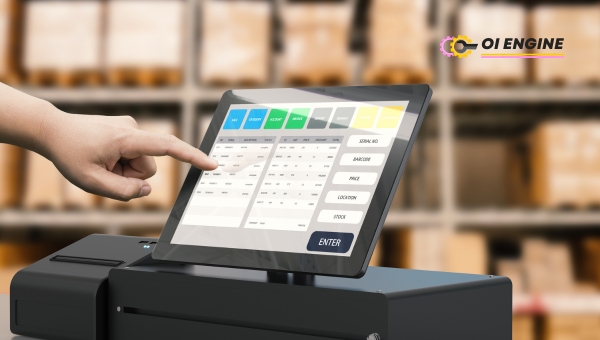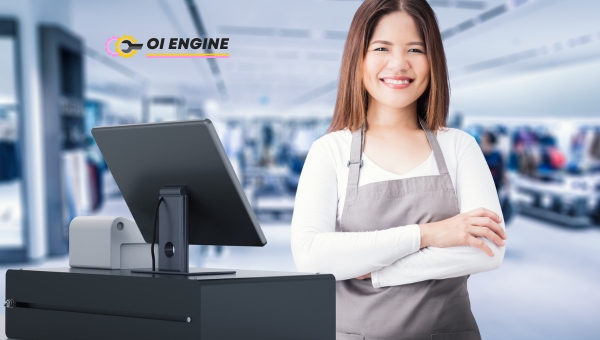The unrelenting march of technology has left no stone unturned, integrating into every aspect of our lives. However, none is as profound as its impact on the world of business.
One technological marvel plays an especially critical role in transforming businesses – POS systems! But what are these mysterious tools taking industries by storm? Here’s a hint – they control your checkouts, streamline operations, and drive revenue growth!
POS or Point-of-Sale systems are dynamic and adhere to the specific requirements of individual businesses.
Essentially, it’s a highly advanced equivalent of traditional cash registers but with added layers of usefulness. In layman’s terms, it refers to the point where a retail transaction happens between sellers and buyers.
What Are POS Systems?
When I walk into a store or coffee shop and make a purchase, my transaction is typically processed by a point of sale system, more commonly known as a POS System.
This cool piece of technology has been around for quite some time now and it plays an essential role in the business world.
So, what exactly is it? Well, at the most basic level, POS Systems are nifty computerized networks that help businesses perform sales correctly and efficiently.
Why Are POS Systems Important?
The usefulness of a simple cash register has faded away with the evolved market needs. This is where POS systems stand out. Their significance in different realms of business can’t be overlooked. Here’s why:
- Saves Time: Firstly, by using highly efficient POS systems businesses no longer need to spend excessive hours on inventory management or on totaling sales. This helps me save time and become far more organized in comparison to times when I have relied solely on cash registers.
- Enhanced Customer Service: The improved speed leads to another significant benefit – enhanced customer service! We’ve all gotten frustrated waiting in super long lines at stores when payments take forever to process—but thanks largely to this technological advance—those days can be reduced dramatically because transactions are swift and precise.
- Secure Transactions: Thirdly, security should be of utmost priority for every business related to finance handling. Thankfully, modern POS systems provide excellent security during every transaction performed; very reassuring for both myself as well as customers while making purchases.
- Detailed Reports: Perhaps one thing that puts me at ease with these systems is their ability to generate detailed reports about sales patterns—which products get sold out soon after arrival—and which sit idle on shelves—capturing such accuracy manually isn’t possible!
- Inventory Management: Last but certainly not least—is inventory management—one area which drains huge resources both manpower-wise and investment-wise becomes streamlined through sophisticated tracking in a POS system. The system tracks each sale, reduces it from inventory, and notifies me when stock is low, helping me monitor my inventories more systematically.
POS systems make the whole sales process far more efficient and centralized—taking it from being cumbersome to something I enjoy!
These are essentially gridline rules that businesses of all sizes can make use of to greatly improve their transactional efficiency.
Also Read: Unleashing Top 10 PEO Services For Smooth Sailing
What are the different components of a POS system?

A POS system is not just one piece of equipment or software, instead, it’s made up of multiple components that work together to create a complete and efficient checkout process.
These different components can range from physical hardware to programs that handle inventory management. Let me explain some of the critical elements in detail.
Inventory Management
A key component of any POS system is inventory management. This refers to how a business keeps track of stock, ensuring they have enough products on hand to meet customer demands while also helping to prevent overstocking or running out.
The inventory management software integrated into many modern POS systems provides real-time updates about your inventory levels as sales are made.
No more guesswork or hours spent manually counting stock. What I love about this feature is the efficiency it brings; it automatically subtracts items sold from your inventory count and alerts you when certain items need reordering.
Computer POS
Computers usually play a central role in most POS systems, serving as the hub where all other components connect.
Depending on the type of business, this can be anything from an ordinary desktop computer with specially installed software, to a more specialized standalone terminal specifically designed for checkout tasks.
They usually have robust processors and sufficient memory storage for large amounts of data input daily from transactions and customer information.
Customer Display
Another key aspect is the customer display. Also known as pole displays or customer-facing screens, these provide customers with vital information like prices, quantities, and product names during checkout.
They help ensure transparency between businesses and their customers by allowing customers to view transaction details as they’re being processed.
POS Terminal
A major component is certainly the actual Point Of Sale terminal. This could be as simple as an electronic cash register or tablet device used in small businesses like coffee shops – but larger retailers might have more sophisticated terminals equipped with barcode scanners & receipt printers.
The terminal is the terminal point of sale where the transaction takes place, making it a critical part of the overall system.
Customer Relationship Management
Last but by no means less significant in any POS system is Customer Relationship Management (or CRM).
This clever software keeps track of customer information and purchase histories, allowing businesses to understand their customers better and create tailored marketing strategies based on individual purchasing habits. In my view, this aspect can significantly help build customer loyalty and increase profits over time.
All these components mentioned above work together to create a comprehensive POS system that enhances not only transactions but also other aspects such as inventory tracking and customer relationship management.
Also Read: How To Get A CDL – Your Ultimate Guide!
How Do POS Systems Work?
Before we dig into the details, let me explain in a simple way: A POS system works like your personal business assistant. It helps manage transactions, inventory, sales, and more. Now, let’s take a closer look at the basic workings of these systems.
Transaction Processing
The primary function of any POS system is to execute transactions. When I swipe my card or insert it into the terminal, here’s what happens:
- Connection Initiated: As soon as I begin my payment process by inserting or swiping my card, the POS system connects with the bank.
- Information Transfer: The system forwards credit card data encrypted for security to your bank for verification.
- Verification Process: The bank checks whether there are sufficient funds in my account to authorize this purchase.
- Transaction Confirmation: If everything checks out on their end, they send back a confirmation message and the transaction goes through successfully!
In case any step in this transaction flow fails – like insufficient funds or failure in encryption – an error message will be displayed on the screen.
Inventory Management
Another key operation of POS systems lies behind setting up shop – managing inventory! It’s exhausting to manually keep track of every product on Shelf ‘A’ or Rack ‘B.’ Well, that’s where a good quality POS System comes in handy.
- Product Tracking: Each item is given a unique SKU number which helps me quickly identify them and check their availability.
- Restocking Alerts: The moment I’m running low on some items; my reliable friend POS promptly warns me so that I can restock before running out completely.
- Sales History Reports: Not just current stock but it also organizes my past sales records helping me understand what sells better during which part of the year and so much more!
If you’re still manually tracking inventory- trust me getting a POS system could easily be one of the best decisions you’d take for your business. It not only saves time but aids future planning, avoids human error in counting, and proactively lets know about products requiring replenishment.
Benefits of Using a Good Quality POS System for Businesses

In the fast-paced business world, the implementation of a good quality POS system can make all the difference.
POS systems are crucial tools that can streamline operations, enhance customer service, and boost sales. Leveraging these benefits can put any business on the path to success.
Increased Efficiency
Good quality POS systems can significantly increase efficiency in businesses. The days when I had to manually track sales and inventory levels are long gone.
These systems automate such tasks, saving me heaps of time that I can now invest in other critical aspects of my business. They help speed up transactions too, so customers don’t have to wait for long at checkout points.
What’s more compelling is that most POS systems integrate seamlessly with other business applications like accounting software or customer relationship management solutions. This integration creates a smooth workflow which greatly improves efficiency.
Improved Accuracy
When it comes to sales transactions and inventory management, accuracy is key. Inaccurate data could lead to significant losses and damage my reputation with my customers – things no business owner wants.
POS systems have helped me keep careful track of every item sold, preventing discrepancies such as double entries or incorrect pricing from creeping into my records.
By utilizing such a system, I’ve been able to eliminate human error as much as possible from point-of-sale transactions.
Detailed Reporting
Detailed reporting is another advantage offered by top-notch POS systems which has proven indispensable in guiding directional decisions for my enterprise over time.
These reports not only provide insights regarding daily sales but also indicate peak selling periods or identify slow-moving items in stock; helping me tweak marketing strategies accordingly while reducing deadstock scenarios – multiplying profits effectively!
Enhanced Customer Experience
With an efficient POS system installed at businesses like mine- long queues get reduced significantly resulting in improved customers’ shopping experience as they appreciate speedy and hassle-free checkout procedures. This satisfaction eventually leads to a more recurrent client base, thereby amplifying revenues.
Choosing The Right System For Your Business
Selecting the right POS system essentially decides how smoothly my business will operate. With various alternatives accessible, picking one that matches well with my business requirements has been crucial for attaining efficiency besides offering versatility in operations.
Moreover, inspecting factors like pricing structure, and ease of integration with other software/s and support services has helped me derive increased functionality out of the POS system- potent enough to take my venture to new heights!
Also Read: 10 Top-Rated Motor Truck Cargo Insurance Companies
FAQs
What is in a POS system?
A POS system includes hardware like cash registers and barcode scanners; it also has software that records sale data for generating reports later.
What is a POS example?
A typical example of a POS is the checkout counter at grocery stores where payments are processed and inventory updated simultaneously thanks to an integrated software solution.
What are the three types of POS?
The three main types of POS systems are retail point-of-sale systems, restaurant point-of-sale systems, and cloud-based point-of-sale systems.
Who uses a POS system?
Almost every retail operation today uses some sort of point-of-sale (POS) system. This includes not only retailers such as clothing stores or restaurants but also wholesalers who supply other businesses.
Also Read: Discover Top 19 Paid CDL Training Programs Trucking Offers
Conclusion
When it comes to managing and growing a business, I have found POS systems to be an invaluable tool. They not only streamline day-to-day transactions but also provide key insights into customer purchasing behavior and product performance.
The right POS system can transform how you run your business for the better, making operations smoother and more profitable. Here’s hoping this guide helped gain an understanding of what is POS, why it matters, and how to choose the correct one for your unique needs.
